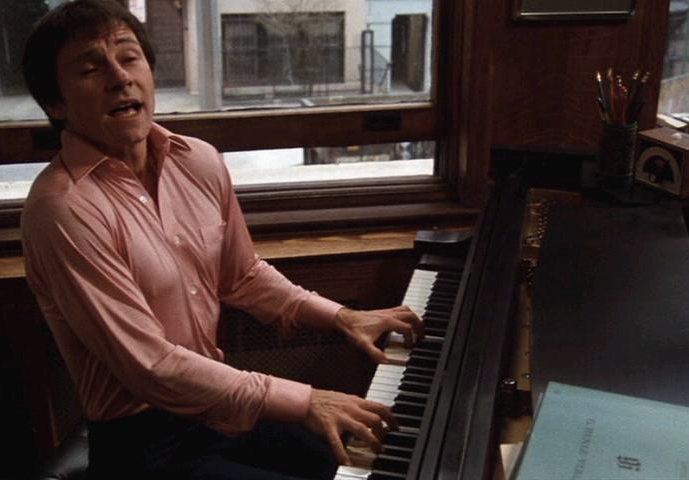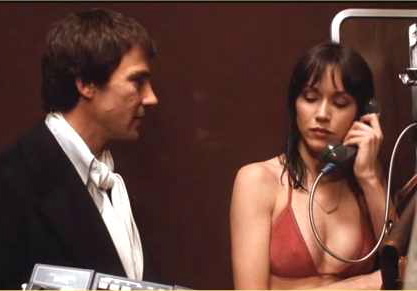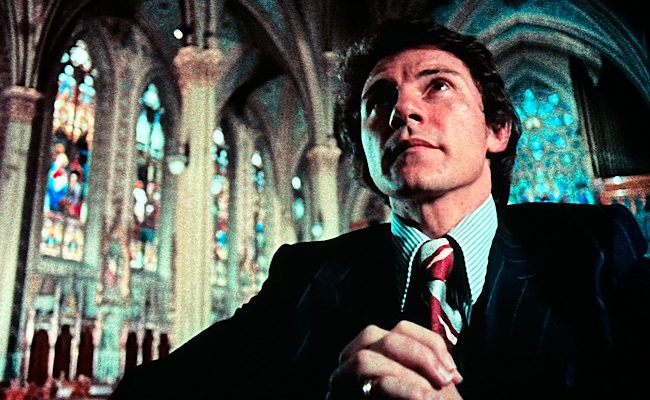(Fingers screens Friday, January 30th, and Saturday, January 31st, as part of the Film Society of Lincoln Center’s series “Mavericks and Outsiders: Positif Celebrates American Cinema.” You can also buy it on DVD at Amazon.)
A pistol-whipping. A near-rape. A prostate exam conducted by anal probe. A fit of claustrophobia in a stalled elevator. An anxiety attack during a fumbled musical audition. A brutal head-butting. Another pistol-whipping. A crushed scrotum. An eye-gouging. Another eye shot out of its socket.
The human body gets a good working over in James Toback’s 1978 debut Fingers, playing this weekend at Lincoln Center’s Walter Reade Theater. It hurts to watch this movie. You wince. You groan. You’re made acutely aware of the fragility of the flesh, at the mercy of all these penetrations, pummelings, and puncturings. Toback has been the creator or co-creator of a handful of powerful films and powerful moments in films, but Fingers has a singular rawness and intensity. It’s a crime story, a thriller of sorts, with sex and violence aplenty, spring-loaded plot points, and other accoutrements of the genre film. But, in David Thomson’s memorable summation, “it is more like a psychological allegory or ordeal. The outward signs of a New York crime movie are only its vehicle—like the body that houses the shivers of a dream. Fingers is that genuine oddity: an American feature movie that treats plot as merely the imprint for compulsive passions of terrible but dynamic force.”
 Jimmy Angelelli (Harvey Keitel, never better) is a divided soul. He collects debts for his Italian-American father, a snarling small-time bookie played by Michael V. Gazzo, the New York actor and playwright best remembered today as The Godfather Part II’s Frankie Pentangeli. His Jewish mother (theater luminary Marian Seldes) was a concert pianist, until madness crippled her. Now Jimmy is pursuing the same goal, immersing himself in Bach even as he makes the rounds of deadbeat debtors. Half thug, half artist, all screwed up, he tears through the film seeking wholeness, control, completion, but with such raw materials as he has to work with, grace is beyond his grasp. “I don’t want to hear it—whatever it is you plan to hurt me with,” his mother says the moment he shows up at the nuthouse for a visit. When Jimmy resists his father’s entreaties to commit murder, Dad tells him, “I shoulda strangled you in your crib.”
Jimmy Angelelli (Harvey Keitel, never better) is a divided soul. He collects debts for his Italian-American father, a snarling small-time bookie played by Michael V. Gazzo, the New York actor and playwright best remembered today as The Godfather Part II’s Frankie Pentangeli. His Jewish mother (theater luminary Marian Seldes) was a concert pianist, until madness crippled her. Now Jimmy is pursuing the same goal, immersing himself in Bach even as he makes the rounds of deadbeat debtors. Half thug, half artist, all screwed up, he tears through the film seeking wholeness, control, completion, but with such raw materials as he has to work with, grace is beyond his grasp. “I don’t want to hear it—whatever it is you plan to hurt me with,” his mother says the moment he shows up at the nuthouse for a visit. When Jimmy resists his father’s entreaties to commit murder, Dad tells him, “I shoulda strangled you in your crib.”
Toback’s only credit prior to his directing debut was the screenplay for Karel Reisz’s underrated 1974 movie The Gambler. James Caan’s character in that film borrows much from the outlines of Toback’s life story—a New York Jew, a literary intellectual with lowlife appetites, a rich kid who pisses away his privileges in a heedless quest for risk and excitement. Jimmy may be a less directly autobiographical creation, but the two movies share a sense that their author is using fiction to work out some deep-seated kinks and twists in his own psychic makeup. As with the work of Norman Mailer, Toback’s late friend and artistic hero, it’s easy enough to mock the excesses of Fingers—the macho romanticism, the wild leaps into pretension, not to mention the film’s risible contribution to White Negro-ism: Jim Brown as a superstud superspade named—wait for it—Dreems. But as with Mailer, there’s a restless intelligence buzzing away here, and in the movie’s strongest scenes, a boiling, gut-churning energy that can’t be denied.
 And also—this, too, finds its parallel in Mailer—the celebration of male power and potency is shadowed by an obsessive concern with their opposites: fear, failure, weakness, loss of will. Underneath all its high-decibel bluster and aggression, the movie seems to be hinting that masculinity is a role Jimmy is forcing himself to play—acting like a man so he can feel like a man. Fake it ’til you make it, as the saying goes. Jimmy is his dad’s muscle, but he’s also a needy, bleating momma’s boy. He’s a pick-up artist who speaks of “heroic fucks” but busts his nut after a few seconds of spastic thrusting. He sits at his grand piano exulting in his virtuosic rendition of a Bach toccata, but when the performance ends we realize he was miming along to a recording. “I can play anything when I’m alone,” he tells the impresario he auditions for at Carnegie Hall. Sure, can’t we all. In our heads, in our dreams. Jimmy is ready to kill a man who insults his taste in music, but later, when he gets the most important call to action of his life, he freezes up in the grip of his neuroses and dithers like the Dane. He finally acts, but by then it’s too late, and the film ends with an indelible image of man regressed to the state of nature, naked and helpless as a newborn.
And also—this, too, finds its parallel in Mailer—the celebration of male power and potency is shadowed by an obsessive concern with their opposites: fear, failure, weakness, loss of will. Underneath all its high-decibel bluster and aggression, the movie seems to be hinting that masculinity is a role Jimmy is forcing himself to play—acting like a man so he can feel like a man. Fake it ’til you make it, as the saying goes. Jimmy is his dad’s muscle, but he’s also a needy, bleating momma’s boy. He’s a pick-up artist who speaks of “heroic fucks” but busts his nut after a few seconds of spastic thrusting. He sits at his grand piano exulting in his virtuosic rendition of a Bach toccata, but when the performance ends we realize he was miming along to a recording. “I can play anything when I’m alone,” he tells the impresario he auditions for at Carnegie Hall. Sure, can’t we all. In our heads, in our dreams. Jimmy is ready to kill a man who insults his taste in music, but later, when he gets the most important call to action of his life, he freezes up in the grip of his neuroses and dithers like the Dane. He finally acts, but by then it’s too late, and the film ends with an indelible image of man regressed to the state of nature, naked and helpless as a newborn.
— Nelson Kim











